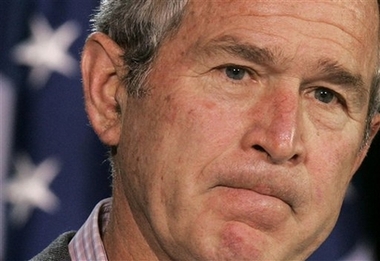Bush to Iran: 'Give back the hostages'
(AP)Updated: 2007-04-01 15:08
"It's inexcusable behavior," Bush said at the Camp David presidential retreat, where he was meeting with the president of Brazil. "Iran must give back the hostages. They're innocent. They did nothing wrong."
It was the first time that Bush had commented publicly on the captured Britons. Washington has taken a low-key approach to avoid aggravating tensions over the incident and shaking international resolve to get Iran to give up its uranium enrichment program.
Bush did not answer a question about whether the United States would have reacted militarily if those captured had been Americans. The president said he supports British Prime Minister Tony Blair's efforts to find a diplomatic resolution to the crisis, now in its second week.
Bush would not comment about Britain's options if Iran does not release the hostages, but he seemed to reject any swapping of the British captives for Iranians detained in Iraq.
"I support the prime minister when he made it clear there were no quid pro quos," Bush said.
Like Bush's words, Iranian President Mahmoud Ahmadinejad's comments were his most extensive on the crisis. They tracked tough talk from other Iranian officials, an indication that Tehran's position could be hardening.
"The British occupier forces did trespass our waters. Our border guards detained them with skill and bravery," Iran's official news agency quoted Ahmadinejad as saying. "But arrogant powers, because of their arrogant and selfish spirit, are claiming otherwise."
Britain, however, appeared to be easing its stance, emphasizing its desire to talk with Iran about what it termed a regrettable situation.
"I think everyone regrets that this position has arisen," British Foreign Secretary Margaret Beckett said at a European Union summit in Bremen, Germany. "What we want is a way out of it."
Iran appeared unreceptive to possible talks with Britain.
"Instead of apologizing over trespassing by British forces, the world arrogant powers issue statements and deliver speeches," Ahmadinejad told a crowd in southeastern Iran.
The British sailors were detained by Iranian naval units March 23 while patrolling for smugglers near the mouth of the Shatt al-Arab, a waterway that has long been a disputed dividing line between Iraq and Iran. Britain also insists the sailors were in Iraqi waters.
In London on Saturday, the political wing of the Iranian opposition group Mujahedeen Khalq said the capture was planned in advance and carried out in retaliation for U.N. sanctions over Iran's nuclear program. The group is listed as a terrorist group by Britain, the U.S. and the European Union.
Blair has expressed disgust that the captured service members had been "paraded and manipulated" in video footage released by Iran. He warned Tehran that it faced increasing isolation if it did not free them.
Britain has frozen most contacts with Iran. The U.N. Security Council has expressed "grave concern" about the incident. The EU has demanded the sailors' unconditional release and warned of unspecified "appropriate measures" if Tehran does not comply - a position the Iranian Foreign Ministry called "bias and meddlesome."
Ahmad Bakhshayesh, a professor of politics in Tehran's Allameh University, said he's convinced that Iran is prepared to stand its ground and insist that the British violated Iranian territory.
"Iran will seriously continue the case and will put them on trial," Bakhshayesh said. "Only an apology by Britain can stop it. Iran thinks that Britons trespassed to test Iran's reaction, and now London is trying to isolate Tehran instead of apologizing."
But British officials are hopeful that diplomacy can resolve the crisis. The Foreign Office confirmed Saturday that Britain had replied to a letter received earlier in this week from the Iranian embassy. It declined to reveal the nature of either letter.
"We have been exchanging letters with the Iranian government, and we will continue to conduct or diplomatic discussions in private," a spokesman said on the government's customary condition of anonymity.
|
||
|
||
|
|


